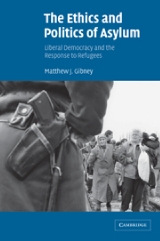Site created by Amplitude. |
||
The Ethics and Politics of Asylum review
The Ethics and Politics of Asylum: Liberal Democracy and the Response to Refugees,
Matthew J Gibney – Cambridge University Press, 2004
Matthew Gibney’s The Ethics and Politics of Asylum is an invaluable weapon for any government that wants to justify its restrictive policies on immigration from the developing and underdeveloped worlds. According to this book, if countries can reasonably show that they cannot afford to take any more people in, then tough luck to the 20 million people presently classed as refugees by the United Nations.
Over the past decade governments have taken drastic measures to stop “unwanted” illegals getting through their borders. Shortly after the reunification of Germany more than a decade ago, the German parliament amended the country’s constitution to slow down the arrival of asylum seekers even though Germany had recognised a constitutional right to asylum since 1949. In 1994 the Clinton Administration in the US launched a military intervention in Haiti in part to restore a regime less likely to produce refugees. In 2001 the Australian government refused to allow a Norwegian freighter, the Tampa, to land on its territory because the ship had hundreds of Iraqi and Afghani asylum seekers on board.
The UK, in the absence of a written constitution and constraints on the system of parliamentary democracy, has had a freer hand to implement policies reflecting popular prejudices towards immigrants and refugees. From last year, under section 55 of the Blair government’s Asylum Immigration and Nationality Act, asylum seekers are refused any financial aid if they have failed to claim asylum “as soon as reasonably practicable”. To put such logic in context, in early 2002 the minister of state for immigration, Lord Rooker, reportedly answered a blunt “no” to the question of whether there existed any legal avenues by which legitimate refugees might enter the UK.
Gibney, an Oxford academic, argues that there are three approaches to asylum and immigration policy. These are: “partiality”, where states are morally obliged to favour the privileges of their own citizens above others; “impartiality”, a liberal approach which compels states to recognise the rights of all peoples; or a “third way” – favoured by Gibney – of “humanitarianism”, that states have an obligation to assist refugees when the cost of doing so is low.
Gibney shifts the moral responsibility of governments to help refugees and asylum seekers onto the laws of economics. In Gibney’s view, desperate people must only be helped at the financial discretion of the developed world. And if these states do not want to help – that they cannot afford to save people from persecution, natural disasters, famine, disease, civil war, genocide, religious, political and sexual intolerance – what then? Send them back? Gibney does not elaborate.
Unfortunately, Gibney’s view is a familiar and popular one and allows governments to give themselves a self-congratulatory pat on the back for at least being seen to consider the issues before continuing their course of inaction.
According to Gibney, the inflexibility of the United Nations’ definition of “refugee” is to blame for the inability of western governments to deal with applications sensibly. Under the 1951 United Nations Convention Relating to the Status of Refugees, refugees are people who, owing to a “well founded fear of persecution” for reasons of political opinion, race, religion, nationality or membership in a particular social group are outside their country of nationality and are unable or unwilling to return to it.
Governments still rely heavily on this definition, even though its appropriateness has increasingly come under question in recent years, namely because it would not cover civilians ravaged and internally displaced by civil war, such as in Somalia, Sudan, Bosnia, and the Kurds in Iraq. The definition also fails to include women who have fled the oppressive strictures of the Taliban, Iraqis displaced by the US-led coalition in Iraq, as well as Zairians escaping the deadly Ebola virus.
It should therefore be of no surprise that civilians from these countries are among the highest numbers of applications for asylum status in the UK, although Gibney does not dwell on these points. Nor does he see any irony in the fact that the US and UK’s efforts to escalate conflict in both Bosnia and Iraq should produce more displaced people looking for refuge in the coalition countries that have sworn to help them.
The major problem with Gibney’s book is that he refers to refugees and asylum seekers as statistics that drain the economy and cost governments a fortune in claims processing. There is no attempt to give them a voice, or even suggest what skills and cultural benefits that they may bring with them, or any discussion of what kind of lives refugees live in their adopted homes. By examining asylum and immigration as an economic argument, Gibney misses the real debate by miles.
“According to Gibney, the inflexibility of the United Nations’ definition of ‘refugee’ is to blame for the inability of western governments to deal with applications sensibly”

